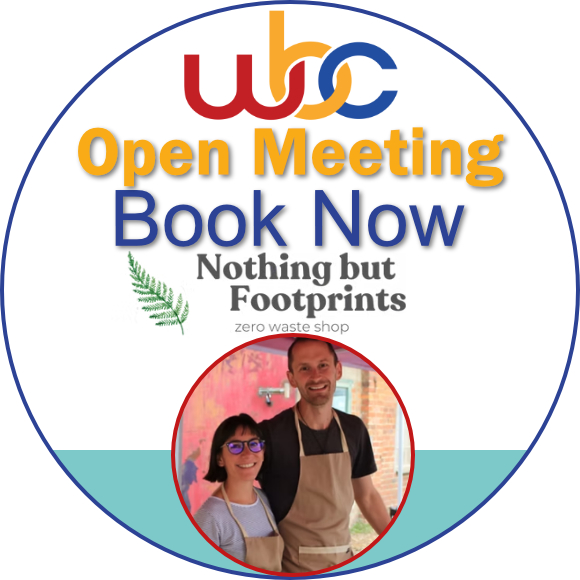Our Blog - Sharing & Informing

WBC Open Meeting Presentation 24 September 2025: Zero-Waste Retail Business Model
Speaker: Dan Ludlow, Nothing But Footprints
Summary
This meeting was a presentation by Dan Ludlow, the founder of a zero-waste refill shop, Nothing But Footprints, and detailed his personal journey and the company's business model.
Dan explained that his motivation stemmed from a disillusionment with unethical practices in mainstream retail and a reawakened passion for environmentalism after witnessing significant ocean pollution while traveling. The business was started with no external financing, growing organically from market stalls to becoming the largest zero-waste shop in Oxfordshire, now located in the Castle Quays Shopping Centre.
The core concept is to reduce packaging waste by allowing customers to bring their own containers to buy bulk goods, including food and cleaning supplies. The business prioritizes ethical and organic sourcing while striving to keep prices accessible to a broad customer base.
The presentation concluded with a detailed Q&A session covering operational aspects like sustainability policies, product labelling, competition with supermarkets, and managing brand ethics.
Founder's Story and Business Motivation
Dan shared his background in retail management, which he left due to discomfort with the high-pressure, unethical selling of store cards and financing. He spent over five years traveling, where an experience diving 50km out at sea and encountering a floating mattress reconnected him with his childhood passion for environmentalism. Upon returning to the UK, he and his wife found it difficult to shop locally without generating waste, which inspired them to start their own zero-waste business. The foundational decision was to create a business that aligned with personal ethical and environmental values.
Business Growth and Philosophy
The business began with no loans, starting with small-scale sales at markets and reinvesting all profits to expand the product range. Dan's philosophy is that a well-run, valuable business will grow organically through customer support. This strategy proved successful, leading to an invitation to open a store in the Boundaries Shopping Centre. This move provided significant exposure, credibility, and a permanent home. The shop is now the largest of its kind in Oxfordshire. A core part of their philosophy is to ensure sustainable shopping is accessible and affordable for everyone, not just a luxury for the wealthy. Dan decided to:
- To grow the business organically without taking on debt.
- To accept the offer for a retail space in a major shopping centre to increase visibility.
- To balance premium organic/ethical products with more affordable options to serve a diverse community.
The Refill Shop Concept and Operations
The business operates on a simple refill model. They purchase a wide range of ambient, vegetarian products (food, cleaning supplies, etc.) in bulk from ethical suppliers and cooperatives. Customers bring their own containers to fill, paying by weight, which eliminates single-use packaging. For customers without containers, the shop offers donated containers and paper bags. Dan noted that this model is often cheaper for consumers for a typical weekly shop of ambient goods compared to supermarkets. The business model is centred on bulk, refillable, and primarily organic/vegetarian products to minimize waste and environmental impact.
Q&A Session
Sustainability & Sourcing Policy
- Dan explained they have a fluid approach rather than a rigid policy. While they always aim for the "perfect" product (e.g., Fairtrade, organic, plastic-free), they must be practical to ensure affordability and availability. They perform a "sense check" on each product to balance ethics with accessibility for their diverse customer base.
Product Branding & Corporate Acquisitions
- The shop supports smaller, ethical brands. However, they face challenges when these brands are acquired by large corporations. Dan cited the example of Wild deodorant, which was recently bought by Unilever. Because Unilever is a major plastic polluter, the shop will phase out Wild products. Dan views these acquisitions as a positive sign that large corporations are finally taking sustainable consumer demand seriously.
Competition with Supermarkets
- Supermarkets have trialled refill stations, but often only with government subsidies. Dan believes their high-volume, low-staff-cost model (2-3% of costs) is incompatible with the labour-intensive nature of refill operations, where staff costs can be 15-20% due to cleaning, restocking, and customer assistance.
Product Labelling (Allergens & Dates)
- In-Store: All dispensers are clearly labelled with full ingredient lists and allergens, as required by law. They have strict protocols for managing allergens, such as keeping all nut products in a separate area.
- At Home: Once a customer has purchased a product, the responsibility for labelling their personal container at home lies with them. This is comparable to buying loose items from a butcher or bakery.
- Expiry Dates: Most products are ambient with long shelf lives (18+ months). Dates are tracked internally for every batch but are not always displayed on the shelf.
Refilling Cleaning Products
- Customers can refill their own bottles (e.g., an empty washing-up liquid bottle). The bottle must be clean on the first use to prevent chemical reactions. The shop provides compliant labels for all chemical products, as they carry a higher risk.
Container Cleaning
- All food dispensers are thoroughly washed between every new batch. This is a highly labour-intensive but essential process to prevent cross-contamination and account for any changes in product recipes.
Pet Food
- The shop does not stock pet food or wild bird seed. This is to mitigate the higher risk of pests associated with these products and because other local shops already serve this market, allowing them to use their space for unique offerings.


To add a comment about this event or blog post open the link below
Subscribe
Report